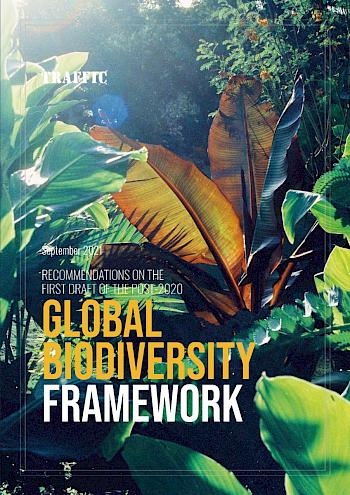TRAFFIC calls for robust targets, indicators and financial commitments in the Post-2020 Global Biodiversity Framework
As governments continued discussions on the Post-2020 Global Biodiversity Framework under the Convention on Biological Diversity’s (CBD) Open-Ended Working Group (OEWG) and deliberated new targets to replace the Aichi Biodiversity Targets, TRAFFIC welcomed progress on finalising the Framework but warned that more needs to be done to ensure its effective implementation.

TRAFFIC called for the Post-2020 Targets to be strengthened with robust indicators to measure progress as well as strong commitments from governments to provide funding resources and technical capacity.
We recognise the first draft, currently under negotiation, means we are closer to adopting ambitious and transformative targets needed for the international community to address the worrying levels of biodiversity decline we see today.”
TRAFFIC's Executive Director, Richard Scobey
“However, without a robust monitoring framework for these targets, we will be doomed to repeat the results of the Global Biodiversity Outlook, which suggested that none of the 20 Aichi Biodiversity Targets were fully met by the target date of 2020."
TRAFFIC hopes that continued negotiations on the Post-2020 targets will consider the practical indicators needed to measure progress on their effective implementation. TRAFFIC acknowledged that numerous Parties expressed concerns over the capacity and resources required by many countries to successfully action such an ambitious framework.
"We are looking forward to working with Parties and through the Biodiversity Indicators Partnership to further develop and refine the monitoring framework. However, we call on Parties to publicly commit to providing the technical and financial support and resources needed for countries to effectively implement the Post-2020 Global Biodiversity Framework, as well as establish clear and structured mechanisms to assist countries in building capacity for their national monitoring systems,” continued Richard Scobey.
For the first time, the draft Post-2020 Global Biodiversity Framework features a target that directly addresses trade of wild species of flora and fauna and targets that recognise the benefits to conservation and humans resulting from the legal and sustainable use of wild species.
TRAFFIC is very encouraged to see that the first draft continues to address the issue of harvesting, trade and use of wild species in Target 5 and the continued emphasis on sustainable use and its benefits to people in Target 9."
Sabri Zain, TRAFFIC’s Director of Policy
“We hope that negotiations on these and the other targets also take into consideration the systemic changes required to both reduce illegal and unsustainable trade and promote sustainable practices to reduce the threat across various species and commodities," he added.
The current COVID-19 pandemic has highlighted the potential threats and intimate link between human, animal, and environmental health. TRAFFIC also welcomed the reference to ‘safe to human health’ in Target 5 and various other targets.
"These discussions reinforced the need for more ambition and coherence in the Framework concerning commitments on the nexus of health and biodiversity alongside the implementation of the One Health approach – especially taking into account the priorities and milestones identified in the Draft Global Action Plan for Biodiversity and Health," Sabri Zain.
TRAFFIC noted that the Framework also continues to address the critical issue of unsustainable use in Target 16, which calls on people to make responsible choices to reduce over-consumption. While Sabri Zain acknowledged that the current wording on making 'responsible choices' can be interpreted to include ‘avoiding unsustainable consumption’, he noted that the current phrasing of the target appears to focus only on waste and over-consumption of food and 'materials'.
He continued, "We hope that there is further discussion on the need to reduce the unsustainable consumption of many other forms of wildlife resources."
The third meeting of the OEWG will close today, 3 September. A final draft of the Post-2020 Global Biodiversity framework is expected to be agreed upon and adopted by governments at the 15th meeting of the Conference of the Parties to the CBD in Kunming, China, from 25 April to 8 May 2022.
Following the negotiations, the Post-2020 Global Biodiversity Framework will also be a significant subject at the IUCN World Conservation Congress, which will take place in Marseilles, France, from 3-11 September 2021.
TRAFFIC recommendations on the first draft of the Post-2020 Global Biodiversity Framework




